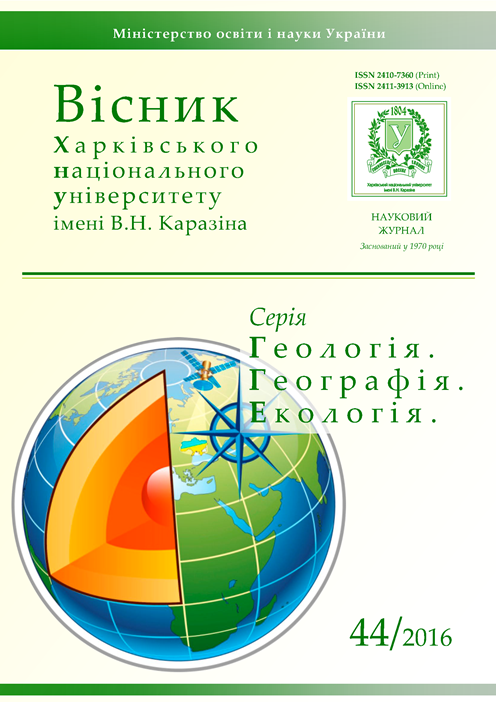Comparative characteristics of drinking water quality standards in some countries
Abstract
The regulation of drinking water is a complex process that develops and is closely linked with the achievements of science and technology. The formation of valuation (regulation) of drinking water is a long historical process of facts accumulation, their synthesis and interpretation using the achievements of related sciences at the appropriate stage of development. The purpose of this study was a comparative analysis of approaches to the regulation of quality indicators of drinking water in the world and in our country, largely due to the need to harmonize national requirements for drinking water with European and international standards, approaches and numerous proposals for such harmonization.The article provides comparative characteristic standards of drinking water quality in various countries of the world and the EU Directive and estimates the number of monitored indicators of water quality for individual countries in the world. It has been proved that the quality of drinking water can be improved by an integrated solution of some problems, the main of which is the development of new technologies of water treatment and maximum harmonization of the national regulatory framework governing drinking water quality, and standards of the developed countries, particularly the EU and WHO recommendations. Lack of sufficient water resources leads to a deficit in drinking water for the population of these countries. This, in turn, determines the difference between the water supply systems and the capital intensity of the water sector in water scarce regions.
Downloads
References
2. Prokopov, V.O., Zorina, O.V., Gulenko, S.V. ect. (2012). Hygienic analysis of state of using systems of drinking-water purification in Ukraine. Hygienic science and practice: modern realities: Materials of ХV congress of Ukrainian sanitarians. 20-21 of September, 2012 year (Lviv). Danilo Galitskiy printing house, 299-302.
3. Goncharuk, V. (2009). Water chemistry and water supply problems of drinking-water. Svitoglyad, 4, 18–27.
4. Grachev, I.A., Antonovich, I.V. (2011). Modern methods of quality control and security of water. Water cleaning technologies, materials of VI international scientific-practical conference, Cheboksary, 20-23 of September, 2011. Novocherkask, 181-186.
5. Grishchenko, S.V., Nagorny, I.M., Svestun, R.S. (2009). Territorial regularity of technogenic environmental pollution in Ukraine. Hygienic and epidemic messenger, 13, 2, 243-248.
6. Dobroslavin, A.R., Erisman, F.F. (1903). М., Brief hygienic book.
7. Socolov, D.M., Kashyntsev, I.V., Socolov, M.S., ect. (2010). Drinking water quality and innovational control methods, problem-anatitic review (drinking water supply). Water supply and sanitarian technology, 8, 15–27.
8. Kobylanskiy, V.Y. (2009). Water quality control in ХХІ century (easy and exactly). Water supply and sewerage, 2, 19–21.
9. Kopilevich, V.A., Voitenko, L.V. (2010). For question about water quality rating for different kinds os water consumption. Water and water treatment technologies, 5-6, 17–20.
10. National report about nature environment state in Ukraine in 2012 year (2012). Ecological and natural recourses Ministry of Ukraine, LAT & K., 450.
11. Onishchenko, G.G., Rahmanin, Y.A., Karmazinov, F.V. (2010). Benchmarking of drinking-water supply. Noviy Jurnal, 432.
12. Cherkinskiy, S.N. (1975). Manual of water supply hygienic. Medicine.
13. Manual of drinking-water control (1993). Second edition. Т1.Recommendations. Geneva: WHO, Medicine, 1994.
14. Stavitskogo, E.A., Rudko, G.I., Yakovleva, E.O. (2011). Strategy of using the groundwater recourses for water supply (T. 1). Chernovtsi, Burker, 1, 500.
15. Stavitskogo, E.A., Rudko, G.I., Yakovleva, E.O. (2011). Strategy of using the groundwater recourses for water supply (T. 2). Chernovtsi, Burker, 2, 348.
16. Drinking water quality and its effect on health of population (2009). Report about natural environment state in Kharkiv region in 2008 year. Protection Ministry of natural environment of Ukraine, sovereign management of security natural environment of Kharkiv region. Kh., 81–86.
17. Yalovenko, V.V. (2007) Several directions of perfections norms of drinking-water quality. Communal city services.
18. Shestopalov, V.M., Ovchinnikova, N.B. (2003). The groundwater and health. The ecology of environment and safety of activity, 1, 19-32.
19. Guidelines for Drinking-Water Quality (2008). Third Edition Incorporating the 1-st and 2-nd Addenda, 1. Recommendations. WHO: Geneva, Switzerland.
20. Zoeteman, B.G.J. (1980). Sensory assessment and chemical composition of drinking water. Oxford etc., 151.
21. Wigle, D.T. et al. (1986). Contaminants in drinking water andcancer risk in Canadian cities. Canadian journal of public health, 77, 5, 335-342.





